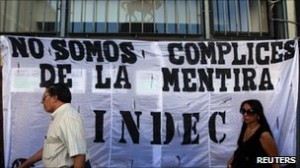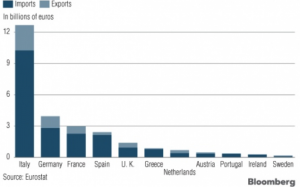
Inflation in Argentina is becoming a problem. Once the prices go up, communities begin to object and eventually the media becomes involved. Although this is not uncommon, there have been several debates regarding how much prices should increase and why.
In response to this, the International Monetary Fund (Fondo Monetario Internactional) have visited different provinces, so that economists and statistics experts from multilateral organisations are able to elaborate an inflation rate that could be used on a national level. The International Monetary Fund was surprised to learn that Córdoba’s (an Argentinean province west of Buenos Aires) statistics are in fact recorded by technicians in Buenos Aires. “Our general management does the field work and supervision. And the burden of data computation is carried out by INDEC – the official statistics office – in Buenos Aires”, explained Paul Sobrero, Córdoba’s statistical holder.
In Córdoba, a local system to measure consumer prices would not work because “to launch such system would implicate a loss of two to three years and we do not possess the methodology in order to undertake such process of comparability, something that is not impossible for the national INDEC”, an official said. In 2010, the inflation in Córdoba was 14.1%.
Mendoza has released an inflation rate of its own this year recording a 0.8% in January with an increase to 0.9% in February. During these months, INDEC mentioned only an increase of 0.7%. In Mendoza, the inflation perceived over 2010 was 20.7%, almost doubling the 10.6% figure given by INDEC for Capital and GBA (Gran Buenos Aires). The highest indicator, however, is Jujuy with a whooping 32.9% inflation rate.
Clearly, there are noticeable differences between the given figures and real figures. Following this discrepancy between records by provinces and official records by INDEC, many opposing politicians, economists and consumers believe the true figure to lie between 25% and 30%, at least for this past year of 2010.
The government has further threatened to fine economic consultants if they do not release how they calculate changes in consumer prices. Guillermo Moreno – Commerce Secretary who has been responsible for defending official figures published by the government – has fined economists on several occasions for releasing what they believe to be the true figures, which are of course not in accordance with official numbers. His line of argument quotes lack of evidence and scientific research leading to unnecessary distress of members of the public. Supporting Moreno is Sergio Kiernan, an editor, saying, “The government still has inflation under control. Inflation is better than recession. Most people here are doing alright”.
It is still a mystery why inflation is so high. Some believe it is due to the government digging into central reserves whilst others think that speculators are driving costs up, in turn causing members of the public to increase their prices in order to keep up. The official reason given by business leaders is public spending.
Inflation has been an on-going problem in Argentina that needs tackling. Will the government support the community? They will have to listen at least, since they soon face elections, coming up in October.

